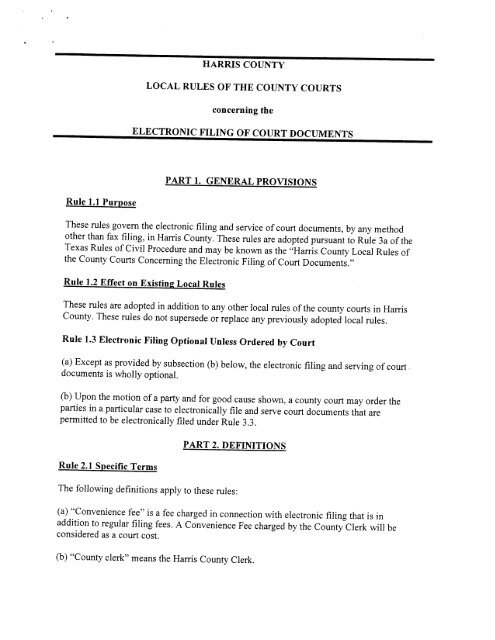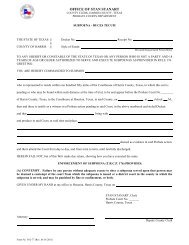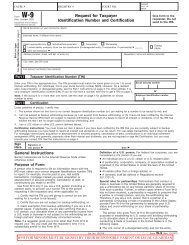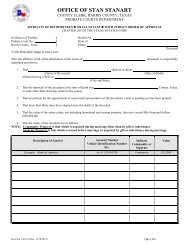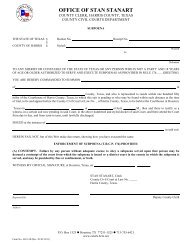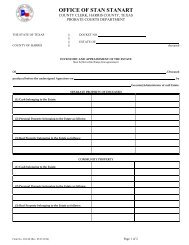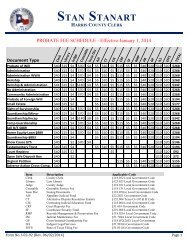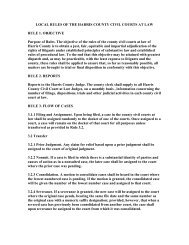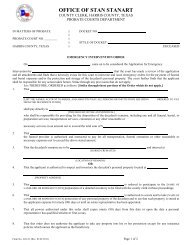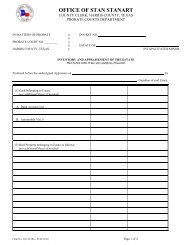Local Rules of Court – Electronic Filing - Harris County Clerk's Office
Local Rules of Court – Electronic Filing - Harris County Clerk's Office
Local Rules of Court – Electronic Filing - Harris County Clerk's Office
Create successful ePaper yourself
Turn your PDF publications into a flip-book with our unique Google optimized e-Paper software.
Rule 1.1 Purpose<br />
HARRIS COUNTY<br />
LOCAL RULES OF THE COUNTY COURTS<br />
concerning the<br />
ELECTRONIC FILING OF COURT DOCUMENTS<br />
PART 1. GENERAL PROVISIONS<br />
These rules govern the electronic filing and service <strong>of</strong>court documents, by any method<br />
other than fax filing , in <strong>Harris</strong> <strong>County</strong>. These rules are adopted pursuant to Rule 3a <strong>of</strong> the<br />
Texas <strong>Rules</strong> <strong>of</strong> Civil Procedure and may be known as the "<strong>Harris</strong> <strong>County</strong> <strong>Local</strong> <strong>Rules</strong> <strong>of</strong><br />
the <strong>County</strong> <strong>Court</strong>s Concerning the <strong>Electronic</strong> <strong>Filing</strong> <strong>of</strong> <strong>Court</strong> Documents."<br />
Rule 1.2 Effect on Existing <strong>Local</strong> <strong>Rules</strong><br />
These rules are adopted in addition to any other local rules <strong>of</strong> the county courts in <strong>Harris</strong><br />
<strong>County</strong>. These rules do not supersede or replace any previously adopted local rules.<br />
Rule 1.3 <strong>Electronic</strong> <strong>Filing</strong> Optional Unless Ordered by <strong>Court</strong><br />
(a) Except as provided by subsection (b) below, the electronic filing and serving <strong>of</strong> court <br />
documents is wholly optional.<br />
(b) Upon the motion <strong>of</strong>a party and for good cause shown, a county court may order the<br />
parties in a particular case to electronically file and serve court documents that are<br />
permitted to be electronically filed under Rule 3.3.<br />
Rule 2.1 Specific Terms<br />
PART 2. DEFINITIONS<br />
The following definitions apply to these rules :<br />
(a) "Convenience fee" is a fee charged in connection with electronic filing that is in<br />
addition to regular filing fees. A Convenience Fee charged by the <strong>County</strong> Clerk will be<br />
considered as a court cost.<br />
(b) "<strong>County</strong> clerk " means the <strong>Harris</strong> <strong>County</strong> Clerk.
(c) "Digitized signature" means a graphic image <strong>of</strong> a handwritten signature.<br />
(d) "Document" means a pleading, plea, motion , application, request, exhibit, brief,<br />
memorandum <strong>of</strong>law, paper, or other instrument in paper form or electronic form. The<br />
term does not include court orders.<br />
(e) "<strong>Electronic</strong> filing" is a process by which a filer files a court document with the county<br />
clerk 's <strong>of</strong>fice by means <strong>of</strong> an online computer transmission <strong>of</strong> the document in electronic<br />
form. For purposes <strong>of</strong>these rules, the process does not include the filing <strong>of</strong>faxed<br />
documents which is described as the "electronic filing <strong>of</strong>documents" in Section 51.801,<br />
Government Code.<br />
(f) "<strong>Electronic</strong> filing service provider (EFSP)" is a business entity that provides electronic<br />
filing services and support to its customers (filers). An attorney or law firm may act as an<br />
EFSP .<br />
(g) "<strong>Electronic</strong> order" means a computerized, non-paper court order that a judge signs by<br />
applying his or her digitized signature to the order. A digitized signature is a graphic<br />
image <strong>of</strong>the judge's handwritten signature .<br />
(h) "<strong>Electronic</strong> service" is a method <strong>of</strong> serving a document upon a party in a case by<br />
electronically transmitting the document to that party's e-mail address.<br />
(i) "<strong>Electronic</strong>ally file" means to file a document by means <strong>of</strong> electronic filing .<br />
CD "<strong>Electronic</strong>ally serve" means to serve a document by means <strong>of</strong>electronic service.<br />
(k) "Filer" means a person who files a document, including an attorney.<br />
(1) "Party" means a person appearing in any case or proceeding, whether represented or<br />
appearing pro se, or an attorney <strong>of</strong>record for a party in any case or proceeding.<br />
(m) "Regular filing fees" are those filing fees charged in connection with traditional<br />
filing.<br />
(n) "<strong>Rules</strong>" are the <strong>Harris</strong> <strong>County</strong> <strong>Local</strong> <strong>Rules</strong> <strong>of</strong> the <strong>County</strong> <strong>Court</strong>s concerning the<br />
<strong>Electronic</strong> <strong>Filing</strong> <strong>of</strong> Documents.<br />
(0) "Traditional court order" means a court order that is on paper.<br />
(P) "Traditional filing" is a process by which a filer files a paper document with a clerk or<br />
ajudge.<br />
Rule 2.2 Application to Pro Se Litigants
The term "counsel" shall apply to an individual litigant in the event a party appears pro<br />
se.<br />
Rule 3.1 Scope<br />
PART 3. APPLICABILITY<br />
(a) These rules apply to the filing <strong>of</strong> documents in all non-juvenile civil cases, including<br />
cases that are appeals from lower courts, before the various county courts with<br />
jurisdiction in <strong>Harris</strong> <strong>County</strong>.<br />
(b) These rules apply to the filing <strong>of</strong> documents in cases before the various county courts<br />
referred to in paragraph (a) above that are subsequently assigned to associate judges or<br />
any other similar judicial authorities.<br />
Rule 3.2 Clerks<br />
These rules apply only to the filing <strong>of</strong> documents with the county clerk. These rules do<br />
not apply to the filing <strong>of</strong>documents directly with a judge as contemplated by TEX. R.<br />
CIV. P. 74.<br />
Rule 3.3 Documents That May Be <strong>Electronic</strong>allv Filed<br />
(a) A document that can be filed in a traditional manner with the county clerk may be<br />
electronically filed with the exception <strong>of</strong>the following documents:<br />
i) citations or writs bearing the seal <strong>of</strong> the court;<br />
ii) returns <strong>of</strong> citation;<br />
iii) bonds ;<br />
iv) wills and codicils thereto;<br />
v) subpoenas;<br />
vi) pro<strong>of</strong><strong>of</strong> service <strong>of</strong>subpoenas;<br />
vii) documents to be presented to a court in camera, solely for the purpose <strong>of</strong><br />
obtaining a ruling on the discoverability <strong>of</strong>such documents;<br />
viii) documents sealed pursuant to TEX. R. ClV. P. 76a; and
ix) documents to which access is otherwise restricted by law or court order,<br />
including a document filed in a proceeding under Chapter 33, Family Code.<br />
(b) A motion to have a document sealed, as well as any response to such a motion, may<br />
be electronically filed.<br />
Rule 3.4. Documents Containing Signatures<br />
(a) A document that is required to be verified, notarized, acknowledged, sworn to, or<br />
made under oath may be electronically filed only as a scanned image.<br />
(b) A document that requires the signatures <strong>of</strong> opposing parties (such as a Rule 11<br />
agreement) may be electronically filed only as a scanned image.<br />
(c) Any affidavit or other paper described in Rule 3.4(a) or (b) that is to be attached to an<br />
electronically filed document may be scanned and electronically filed along with the<br />
underlying document.<br />
(d) Where a filer has electronically filed a scanned image under this rule, a court may<br />
require the filer to properly file the document in a traditional manner with the county<br />
clerk. A third party may request the court in which the matter is pending to allow<br />
inspection <strong>of</strong> a document maintained by the filer.<br />
Rule 4.1 TexasOnline<br />
PART 4. FILING MECHANICS<br />
(a) Texas Online is a project <strong>of</strong> the TexasOnlirie Authority, a state entity charged with<br />
establishing a common electronic infrastructure through which state agencies and local<br />
governments may electronically send and receive documents and required payments.<br />
(b) To become registered to electronically file documents, filers must follow registration<br />
procedures outlined by TexasOnline. The procedure can be accessed from TexasOnline's<br />
website at ..www.texasonline.com."<br />
(c) Filers do not electronically file documents directly with the county clerk. Rather, filers<br />
indirectly file a document with the county clerk by electronically transmitting the<br />
document to an electronic filing service provider (EFSP) which then electronically<br />
transmits the document to TexasOnline which then electronically transmits the document<br />
to the county clerk. A filer filing or serving a document must have a valid account with an<br />
EFSP and with TexasOnline<br />
(d) Consistent with standards promulgated by the Judicial Committee on Information<br />
Technology (JCIT), TexasOnline will specify the permissible formats for documents that<br />
will be electronically filed and electronically served.
(e) Filers who electronically file documents will pay regular filing fees to the county clerk<br />
indirectly through TexasOnline by a method set forth by TexasOnline.<br />
(f) An EFSP may charge filers a convenience fee to electronically file documents. This<br />
fee will be in addition to regular filing fees.<br />
(g) TexasOnline will charge filers a convenience fee to electronically file documents.<br />
This fee will be in addition to regular filing fees and will be in an amount not to exceed<br />
the amount approved by the TexasOnline Authority.<br />
(h) The county clerk may charge filers a convenience fee to electronically file documents.<br />
This fee will be in addition to regular filing fees, credit card fees, or other fees.<br />
Rule 4.2 Signatures<br />
(a) Upon completion <strong>of</strong>the initial registration procedures, each filer will be issued a<br />
confidential and unique electronic identifier. Each filer must use his or her identifier in<br />
order to electronically file documents. Use <strong>of</strong> the identifier to electronically file<br />
documents constitutes a "digital signature" on the particular document.<br />
(b) The attachment <strong>of</strong> a digital signature on an electronically-filed document is deemed to<br />
constitute a signature on the document for purposes <strong>of</strong> signature requirements imposed by<br />
the Texas <strong>Rules</strong> <strong>of</strong> Civil Procedure or any other law. The person whose name appears<br />
first in the signature block <strong>of</strong> an initial pleading is deemed to be the attorney in charge for<br />
the purposes <strong>of</strong> Texas <strong>Rules</strong> <strong>of</strong> Civil Procedure 8, unless otherwise designated. The<br />
digital signature on any document filed is deemed to be the signature <strong>of</strong> the attorney<br />
whose name appears first in the signature block <strong>of</strong> the document for the purpose <strong>of</strong> Texas<br />
<strong>Rules</strong> <strong>of</strong>Civil Procedure 13 and 57.<br />
(c) A digital signature on an electronically-filed document is deemed to constitute a<br />
signature by the filer for the purpose <strong>of</strong> authorizing the payment <strong>of</strong> document filing fees.<br />
Rule 4.3 Time Document is Filed<br />
(a) A filer may electronically transmit a document through an EFSP to TexasOnline 24<br />
hours per day each and every day <strong>of</strong> the year, except during brief periods <strong>of</strong> stateapproved<br />
scheduled maintenance which will usually occur in the early hours <strong>of</strong> Sunday<br />
mornmg.<br />
(b) Upon sending an electronically-transmitted document to a filer's EFSP, the filer is<br />
deemed to have delivered the document to the county clerk and, subject to Rule 4.3(h),<br />
the document is deemed to be filed. If a document is electronically transmitted to the<br />
filer's EFSP and is electronically transmitted on or before the last day for filing the same ,<br />
the document, if received by the county clerk not more than ten days tardily, shall be filed
y the county clerk and deemed filed in time. A transmission report by the filer to the<br />
filer's EFSP shall be prima facie evidence <strong>of</strong> date and time <strong>of</strong>transmission.<br />
(c) On receipt <strong>of</strong> a filer's document, the filer's EFSP must send the document to Texas<br />
Online in the required electronic file format along with an indication <strong>of</strong> the time the filer<br />
sent the document to the EFSP and the filer's payment information. TexasOnline will<br />
electronically transmit to the filer an "acknowledgment" that the document has been<br />
received by TexasOnline. The acknowledgment will note the date and time that the<br />
electronically-transmitted document was received by TexasOnline.<br />
(d) Upon receiving a document from a filer's EFSP , TexasOnline shall electronically<br />
transmit the document to the county clerk. Ifthe document was not properly formatted,<br />
Texas Online will transmit a warning to the filer 's EFSP.<br />
(e) Not later than the first business day after receiving a document from TexasOnline, the<br />
county clerk shall decide whether the document will be accepted for filing. The county<br />
clerk shall accept the document for filing provided that the document is not misdirected<br />
and complies with all filing requirements. The county clerk shall handle electronicallytransmitted<br />
documents that are filed in connection with an affidavit <strong>of</strong> inability to afford<br />
court costs in the manner required by TEX. R. CfV . P. 145. If the county clerk fails to<br />
accept or reject a document within the time period, the document is deemed to have been<br />
accepted and filed .<br />
(f) If the document is accepted for filing , the county clerk shall note the date and time <strong>of</strong><br />
filing which, with the exception <strong>of</strong> subsection (h) below, shall be the date and time that<br />
the filer transmitted the document to the filer's EFSP . The county clerk shall inform<br />
TexasOnline <strong>of</strong> its action the same day action is taken. TexasOnline shall , on that same<br />
day, electronically transmit to the filer 's EFSP a "confirmation" that the document has<br />
been accepted for filing by the county clerk. The EFSP will electronically transmit the<br />
confirmation to the filer. This confirmation will include an electronically "file-marked"<br />
copy <strong>of</strong>the front page <strong>of</strong> the document showing the date and time the county clerk<br />
considers the document to have been filed.<br />
(g) Ifthe document is not accepted for filing, the county clerk shall inform TexasOnline<br />
<strong>of</strong> its action, and the reason for such action, the same day action is taken. TexasOnline<br />
shall , on that same day, electronically transmit to the filer 's EFSP an "alert" that the<br />
document was not accepted along with the reason the document was not accepted. The<br />
EFSP will electronically transmit the alert to the filer.<br />
(h) Except in cases <strong>of</strong> injunction, attachment, garnishment, sequestration, or distress<br />
proceedings, documents that serve to commence a civil suit will not be deemed to have<br />
been filed on Sunday when the document is electronically transmitted to the filer's EFSP,<br />
TexasOnline, or the county clerk on Sunday. Such documents will be deemed to have<br />
been filed on the succeeding Monday.
Rule 4.4 <strong>Filing</strong> Deadlines Not Altered<br />
The electronic filing <strong>of</strong> a document does not alter any filing deadlines.<br />
Rule 4.5 Multiple Documents<br />
(a) Except as provided by subsection (b) below, a filer may include only one document in<br />
an electronic transmission to TexasOnline.<br />
(b) A filer may electronically transmit a document to TexasOnline that includes another<br />
document as an attachment (e.g., a motion to which is attached a brief in support <strong>of</strong> the<br />
motion).<br />
Rule 4.6 Official Document<br />
(a) The county clerk's file for a particular case may contain a combination <strong>of</strong><br />
electronically-filed documents and traditionally-filed documents.<br />
(b) The county clerk may maintain and make available electronically-filed documents in<br />
any manner allowed by law.<br />
Rule 4.7 E-mail Address Required<br />
In addition to the information required on a pleading by TEX. R. CN. P. 57, a filer must<br />
include an e-mail address on any electronically-filed document.<br />
Rule 4.8 Document Format<br />
(a) <strong>Electronic</strong>ally-filed documents must be computer-formatted as specified by<br />
TexasOnline. <strong>Electronic</strong>ally-filed documents must also be formatted for printing on 8Y:!inch<br />
by l l-inch paper.<br />
(b) An electronically-filed pleading is deemed to comply with TEX. R. CIV. P. 45.<br />
PART 5. SERVICE OF DOCUMENTS OTHER THAN CITATION<br />
Rule 5.1 <strong>Electronic</strong> Service <strong>of</strong> Documents Permissible<br />
(a) In addition to the methods <strong>of</strong> serving documents (other than the citation to be served<br />
upon the filing <strong>of</strong> a cause <strong>of</strong> action) set forth in TEX. R. CN. P. 21a, a filer may serve<br />
documents upon another party in the case by electronically transmitting the document to<br />
that party at the party's email address . Service in such a manner is known as "electronic<br />
service," and is permissible in the circumstances set out in paragraph (b) below.
(b) Documents may be electronically served upon a party only where that party has agreed<br />
to receive electronic service or where the court has ordered the parties to electronically<br />
serve documents .<br />
(c) By virtue <strong>of</strong> electronically filing a document or serving a document or by agreeing to<br />
accept service, a filer additionally agrees to provide information regarding any change in<br />
his or her e-mail address to TexasOnline, the county clerk, and all parties in the case.<br />
(d) A party who electronically files a document is not required to electronically serve<br />
documents upon other parties unless the court has ordered the parties to electronically<br />
serve documents.<br />
(e) A filer may electronically serve a document in instances where the document is<br />
traditionally filed as well as in instances where the document is electronically filed.<br />
Rule 5.2 Completion <strong>of</strong> Service and Date <strong>of</strong> Service<br />
(a) <strong>Electronic</strong> service shall be complete upon transmission <strong>of</strong> the document by the filer to<br />
the party at the party's e-mail address.<br />
(b) Except as provided by subsection (c) below, the date <strong>of</strong> service shall be the date the<br />
electronic service is complete.<br />
(c) When electronic service is complete after 5:00 p.m. (recipient's time), then the date <strong>of</strong><br />
service shall be deemed to be the next day that is not a Saturday, Sunday or legal holiday.<br />
Rule 5.3 Time for Action After Service<br />
Whenever a party has the right or is required to do some act within a prescribed period <strong>of</strong><br />
time after service <strong>of</strong> a document upon the party and that document is electronically<br />
served, then three days shall be added to the prescribed period <strong>of</strong> time.<br />
Rule 5.4 Certification <strong>of</strong> Service<br />
(a) Documents to be electronically served upon another party shall be served before the<br />
time or at the same time that the document is filed.<br />
(b) A filer who electronically serves a document upon another party shall make a written<br />
certification <strong>of</strong>such service that shall accompany the document when that document is<br />
filed. The written certification shall include, in addition to any other requirements<br />
imposed by the Texas <strong>Rules</strong> <strong>of</strong> Civil Procedure, the following :<br />
(i) the filer 's e-mail address or telecopier (facsimile machine) number;<br />
(ii) the recipient's e-mail address ;
(iii) the date and time <strong>of</strong> electronic service; and<br />
(iv) a statement that the document was electronically served and that the<br />
electronic transmission was reported as complete .<br />
PART 6. ELECTRONIC ORDERS AND VIEWING OF ELECTRONICALLY<br />
FILED DOCUMENTS<br />
Rule 6.1 <strong>Court</strong>s Authorized to Make <strong>Electronic</strong> Orders<br />
(a) A judge may electronically sign an order by applying his or her digitized signature to<br />
the order. Judges are not required to electronically sign orders.<br />
(b) Upon electronically signing an order, the judge shall electronically forward the order<br />
to the county clerk who may treat the electronic order as the <strong>of</strong>ficial copy <strong>of</strong> the order.<br />
Alternatively, the county clerk may print the electronic order and treat the printed order as<br />
the <strong>of</strong>ficial copy <strong>of</strong> the order.<br />
(c) The county clerk may electronically scan a traditional court order. The scanned court<br />
order may then serve as the <strong>of</strong>ficial copy <strong>of</strong> the court order. The county clerk is not<br />
required to electronically scan traditional court orders in order to create <strong>of</strong>ficial electronic<br />
court orders. <strong>Electronic</strong> scanning <strong>of</strong>traditional court orders is at the option <strong>of</strong>the county<br />
clerk.<br />
Rule 6.2 Viewing <strong>of</strong> <strong>Electronic</strong>ally-filed Documents<br />
(a) The county clerk shall ensure that all the records <strong>of</strong> the court, except those made<br />
confidential or privileged by law or statute, may be viewed in some format by all persons<br />
for free.<br />
(b) Independent <strong>of</strong> the TexasOnline system and the requirement <strong>of</strong> viewing access<br />
described in subsection (a), the county clerk may choose to provide for both filers and the<br />
general public to electronically view documents or court orders that have been<br />
electronically filed or scanned. Where such provision has been made, persons may<br />
electronically view documents or court orders that have been electronically filed or<br />
scanned.<br />
(c) Nothing in this rule allows for the viewing <strong>of</strong> documents or court orders, in any form,<br />
that are legally confidential (e.g., papers in mental health dealings ) or otherwise restricted<br />
by judicial rule or order.<br />
PART 7. MISCELLANEOUS PROVISIONS<br />
Rule 7.1 Assigned <strong>Court</strong> to Resolve Disputes


